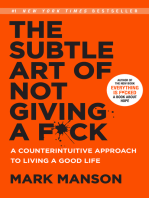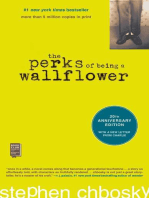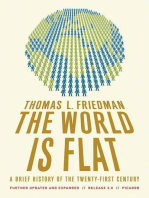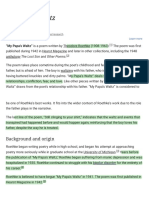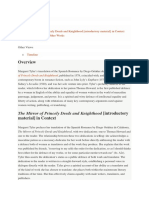0 ratings0% found this document useful (0 votes)
147 viewsSandboxetext PDF
Sandboxetext PDF
Uploaded by
Ankur PaulCopyright:
© All Rights Reserved
Available Formats
Download as PDF or read online from Scribd
Sandboxetext PDF
Sandboxetext PDF
Uploaded by
Ankur Paul0 ratings0% found this document useful (0 votes)
147 views7 pagesOriginal Title
sandboxetext.pdf
Copyright
© © All Rights Reserved
Available Formats
PDF or read online from Scribd
Share this document
Did you find this document useful?
Is this content inappropriate?
Copyright:
© All Rights Reserved
Available Formats
Download as PDF or read online from Scribd
Download as pdf
0 ratings0% found this document useful (0 votes)
147 views7 pagesSandboxetext PDF
Sandboxetext PDF
Uploaded by
Ankur PaulCopyright:
© All Rights Reserved
Available Formats
Download as PDF or read online from Scribd
Download as pdf
You are on page 1of 7
Edward Albee
THE SANDBOX
A Brief Play, in Memory of My Grandmother (1876-1959)
PLAYERS
THE YOUNG Man, 25, a good-looking, well-built boy in a bathing suit
Mommy, 5S, a well-dressed, imposing woman
Dappy, 60, a small man; gray, thin
GRANDMA, 86, a tiny, wizened woman with bright eyes
THE MUSICIAN, no particular age, but young would be nice
Note. When, in the course of the play, MOMMY and Danby call each other
by these names, there should be no suggestion of regionalism. These names are of
empty affection and point up the pre-senility and vacuity of their characters.
THE SANDBOX Written in 1959, Edward Albee, abandoned by his natural parents, was
adopted two weeks after birth in 1928 by a wealthy couple in Westchester County, New
York, and named after his adoptive grandfather, part owner of the Keith-Albee string of
movie-and-vaudeville theaters. His early schooling frequently interrupted by family vaca-
tions, Albee attended a variety of private schools. Dismissed from Trinity College (Con-
necticut) after three semesters, he went to Greenwich Village, against his foster parents’
wishes, determined to write. For about ten years he tried poetry and fiction while work-
ing at various odd jobs to supplement a weekly allowance from a trust fund established by
his grandmother. After the success of his first play, Zoo Story (1959), and the completion
of a second, Albee interrupted work on The American Dream when commissioned to do a
short play for an international theatrical festival. For this play (The Sandbox) he used
characters from the work in progress placed in a different situation and setting. Despite
its overlap of characters and themes with The American Dream (1961), it is a separate play,
and Albee in 1966 declared it his favorite among his plays (which then numbered about
ten including Who’s Afraid of Virginia Woolf?).
THE ScENE. A bare stage, with only the following: Near the footlights, far
stage-right, two simple chairs set side by side, facing the audience; near the
footlights, far stage-left, a chair facing stage-right with a music stand before it;
farther back, and stage-center, slightly elevated and raked, a large child’s sand-
box with a toy pail and shovel; the background is the sky, which alters from
brightest day to deepest night.
At the beginning, it is brightest day; the YOUNG MAN is alone on stage to the
rear of the sandbox, and to one side. He is doing calisthenics; he does calisthenics
until quite at the very end of the play. These calisthenics, employing the arms
only, should suggest the beating and fluttering of wings. The YOUNG MAN is,
after all, the Angel of Death.
‘Mommy and Danby enter from stage-left, MOMMY first.
Mommy (motioning to Dappy). Well, here we are; this is the beach.
Dappy (whining). I’m cold.
Mommy (dismissing him with a little laugh). Don’t be silly; it’s as warm
as toast. Look at that nice young man over there: he doesn’t think it’s cold.
(Waves to the YOUNG MAN) Hello.
YOUNG MAN (with an endearing smile). Hi!
Mommy (looking about). This will do perfectly . . . don’t you think so,
Daddy? There’s sand there . . . and the water beyond. What do you think,
Daddy?
Dappy (vaguely). Whatever you say, Mommy.
Mommy (with the same little laugh). Well, of course. . . whatever I say.
Then, it’s settled, is it?
Dappy (shrugs). She’s your mother, not mine.
Mommy. I know she’s my mother. What do you take me for? (A
pause) All right, now; let’s get on with it. (She shouts into the wings, stage-
left) You! Out there! You can come in now. (The MUSICIAN enters, seats
himself in the chair, stage-left, places music on the music stand, is ready to play.
Mommy nods approvingly.) Very nice; very nice. Are you ready, Daddy?
Let’s go get Grandma.
Dappy. Whatever you say, Mommy.
Mommy (leading the way out, stage-left). Of course, whatever I say. (To
the MusIcIAN) You can begin now. (The MUSICIAN begins playing; MOMMY
and Dappy exit; the MUSICIAN, all the while playing, nods to the YOUNG
Man.)
YounG MAN (with the same endearing smile). Hi! (After a moment,
Mommy and Dappy re-enter, carrying GRANDMA. She is borne in by their
hands under her armpits; she is quite rigid; her legs are drawn up; her feet do not
touch the ground; the expression on her ancient face is that of puzzlement and
fear.)
Dappy. Where do we put her?
MoMMY ue same little laugh). Wherever I say, of course. Let me
see... well... all right, over there . . . in the sandbox. (Pause) Well,
what are you waiting for, Daddy? . . . The sandbox! (Together they carry
GRANDMA over to the sandbox and more or less dump her in.)
GRANDMA (righting herself to a sitting position; her voice a cross between a
baby’s laugh and cry). Ahhhhhh! Graaaaa!
Danby (dusting himself). What do we do now?
MomMy (to the MUSICIAN). You can stop now. (The MUSICIAN stops.)
(Back to Dapp) What do you mean, what do we do now? We go over there
and sit down, of course. (To the YOUNG MAN) Hello there.
YOuNG MAN (again smiling). Hi! (MOMMY and DADDY move to the
chairs, stage-right, and sit down. A pause.)
GRANDMA (same as before). Abhhhhh! Ah-haaaaaa! Graaaaaa!
Dappy. Do you think . . . do you think she’s . . . comfortable?
Mommy (impatiently). How would I know?
Dappy (pause). What do we do now?
Mommy (as if remembering). We. . . wait. We. . . sithere. . and we
wait . . . that’s what we do.
Dappy (after a pause). Shall we talk to each other?
Mommy (with that little laugh; picking something off her dress). Well, you
can talk, if you want to . . . if you can think of anything to say . . . if you
can think of anything new.
Dappy (thinks). No . . . I suppose not.
Mommy (with a triumphant laugh). Of course not!
GRANDMA (banging the toy shovel against the pail). Haaaaaa! Ah-ha-
aaaaa!
Mommy (out over the audience). Be quiet, Grandma . . . just be quiet,
and wait. (GRANDMA throws a shovelful of sand at MOMMY. Still out over the
audience) She’s throwing sand at me! You stop that, Grandma; you stop
throwing sand at Mommy! (To Dappy) She’s throwing sand at me. (DADDY
looks around at GRANDMA, who screams at him.)
GRANDMA. GRAAAAA!
Mommy. Don’t lookat her. Just. . . sithere. . . be very still. . . and
wait. (To the MUSICIAN) You. . . uh. . . you go ahead and do whatever it
is you do. (The MUSICIAN plays. MoMMY and Dapby are fixed, staring out
beyond the audience. GRANDMA looks at them, looks at the MuSICIAN, looks at
the sandbox, throws down the shovel.)
GRANDMA. Ah-haaaaaa! Graaaaaa! (Looks for reaction; gets none.
Now .. . directly to the audience) Honestly! What a way to treat an old
woman! Drag her out of the house. . . stick her ina car. . . bring her out
here from the city. . . dump her ina pile of sand. . . and leave her here to
set. I’m eighty-six years old! I was married when I was seventeen. To a
farmer. He died when I was thirty. (To the MUSICIAN) Will you stop that,
Please? (The MUSICIAN stops playing.) I’m a feeble old woman . . . how do
you expect anybody to hear me over that peep! peep! ! (To
There’s no respect around here. (To the YOUNG MAN) Thewene a
around here!
YOuNG MAN (same smile). Hi!
GRANDMA (after a pause, a mild double-take, continues, to the audience).
My husband died when I was thirty (indicates MoMMY), and I had to raise
that big cow over there all by my lonesome. You can imagine what that was
like. Lordy! (To the YouNG MAN) Where’d they get you?
Younc MAN. Oh. .. I’ve been around for a while.
GRANDMA. T’ll bet you have! Heh, heh, heh. Will you look at you!
YOUNG MAN (flexing his muscles). Isn’t that something? (Continues his
calisthenics.)
GRANDMA. Boy, oh boy; I’ll say. Pretty good.
YOUNG MAN (sweetly). T’ll say.
GRANDMA. Where ya from?
YounG MAN. Southern California.
GRANDMA (nodding). Figgers; figgers. What’s your name, honey?
Younc Man. I don’t know...
GRANDMA (to the audience). Bright, too!
YOuNG Man. I mean. . . I mean, they haven’t given me one yet. . .
the studio . . .
GRANDMA (giving him the once-over). You don’t say . . . you don’t say.
‘Well . . . uh, I’ve got to talk some more . . . don’t you go ’way.
YounG Man. Oh, no.
GRANDMA (turning her attention back to the audience). Fine; fine. (Then,
once more, back to the YOUNG MAN) You’re . . . you’re an actor, hunh?
YOUNG MAN (beaming). Yes. I am.
GRANDMA (to the audience again; shrugs). I’m smart that way. Anyhow,
Thad to raise . . . that over there all by my lonesome; and what’s next to
her there . . . that’s what she married. Rich? I tell you. . . money, money,
money. They took me off the farm. . . which was real decent of them. . .
and they moved me into the big town house with them . . . fixed a nice
place for me under the stove . . . gave me an army blanket . . . and my
own dish . . . my very own dish! So, what have I got to complain about?
Nothing, of course. I’m not complaining. (She looks up at the sky, shouts to
someone off stage) Shouldn’t it be getting dark now, dear? (The lights dim;
night comes on. The MUSICIAN begins to play; it becomes deepest night. There
are spots om all the players, including the YOUNG MAN, who is, of course,
continuing his calisthenics.)
Danpy (stirring). It’s nighttime.
Mommy. Shhhh. Be still . . . wait.
Dappy (whining). It’s so hot.
Mommy. Shhhbhh. Be still . . . wait.
GRANDMA (to herself). That’s better. Night. (To the Musician) Honey,
do you play all through this part? (The MUSICIAN nods.) Well, keep it nice
and soft; that’s a good boy. (The MusIcIan nods again; plays softly.) That’s
nice. (There is an off-stage rumble.)
Danby (starting). What was that?
MOMMY (beginning to weep). It was nothing.
Dappy. It was. was... thunder. . . ora wave breaking. . . or
something.
Mommy (whispering, through her tears). It was an off-stage rumble. . .
and you know what that means . . .
Dappy. I forget...
Momwmy (barely able to talk). It means the time has come for poor
Grandma . . . and I can’t bear it!
Dappy (vacantly). I... I suppose you’ve got to be brave.
GRANDMA (mocking). That’s right, kid; be brave. You’ll bear up; you'll
get over it. (Another off-stage rumble . . . louder.)
Mommy. Obhhhhhhhhh . . . poor Grandma. . . poor Grandma. . .
GRANDMA (to Mommy). I’m fine! I’m all right! It hasn’t happened yet!
(A violent off-stage rumble. All the lights go out, save the spot on the YOUNG
Man; the MUSICIAN stops playing.)
Mommy. Obhhhhhhhh . . . Ohhhhhhhhhh . . . (Silence.)
GRANDMA. Don’t put the lights up yet . . . I’m not ready; I’m not
quite ready. (Silence) All right, dear . . . I’m about done. (The lights come
up again, to brightest day; the MUSICIAN begins to play. GRANDMA ts discov-
ered, still in the sandbox, lying on her side, propped up on an elbow, half
covered, busily shoveling sand over herself.)
GRANDMA (muttering). I don’t know how I’m supposed to do anything
with this goddam toy shovel . . .
Dappy. Mommy! It’s daylight!
Momny (brightly). So it is! Well! Our long night is over. We must put
away our tears, take off our mourning . . . and face the future. It’s our
duty.
GRANDMA (still shoveling; mimicking). . . . take off our mourning. . .
face the future . . . Lordy! (MOMMY and Dappy rise, stretch. MOMMY
waves to the YOUNG MAN.)
YOUNG MAN (with that smile). Hi! (GRANDMA plays dead.[!] Mommy
and Dappy go over to look at her; she is a little more than half buried in the
sand; the toy shovel is in her hands, which are crossed on her breast.)
Mommy (before the sandbox; shaking her head). Lovely! It’s . . . it’s
hard to be sad. . . she looks . . . so happy. (With pride and conviction) It
pays to do things well. (To the Musician) All right, you can stop now, if
you want to. I mean, stay around for a swim, or something; it’s all right
with us. (She sighs heavily) Well, Daddy . . . off we go.
Dappy. Brave Mommy!
Mommy. Brave Daddy! (They exit, stage left.)
GRANDMA (after they leave; lying quite still). It pays to do things
well. . . Boy, oh boy! (She tries to sit up). . . well, kids . . . (but she finds
she can’t)... 1... I can’t get up. 1... can’t move . . . (The YOUNG
Man stops his calisthenics, nods to the MUSICIAN, walks over to GRANDMA,
kneels down by the sandbox.)
GRANDMA. I... can’t move...
Younc Man. Shhhhh . . . be very still...
GRANDMA. I... I can’t move...
Younc Man. Uh... ma’am;I...1 have a line here.
GranpMA. Oh, I’m sorry, sweetie; you go right ahead.
Younc Man. Iam...uh...
GRANDMA. Take your time, dear.
YOUNG MAN (prepares; delivers the line like a real amateur). I am the
Angel of Death. Iam... uh .. . I am come for you.
GRANDMA. What. . . wha. . . (then, with resignation). . . ohhhh. . .
ohhhh, I see. (The YOUNG MAN bends over, kisses GRANDMA gently on the
forehead.)
GRANDMA (her eyes closed, her hands folded on her breast again, the shovel
between her hands, a sweet smile on her face). Well. . . that was very nice,
dear...
YOUNG Man (still kneeling). Shhhhh . . . be still. . .
GRANDMA. What I meant was . . . you did that very well, dear .
YOUNG Man (blushing). ...oh...
GRANDMA. No; I mean it. You’ve got that... you’ve got a quality.
YOUNG Man (with his endearing smile). Oh. . . thank you; thank you
very much . . . ma’am.
GRANDMA (slowly; softly—as the YOUNG MAN puts his hands on top of
GRANDMA’s). You're . . . you’re welcome . . . dear.
(Tableau. The MUSICIAN continues to play as the curtain slowly comes
-)
QUESTIONS
1. On the face of it, this little play is absurd—absurd both in the way it is
presented and in what happens in it. Is it therefore simply horseplay, or
does it have a serious subject? What is its subject?
2. The word absurd, used above, itself demands attention, since it has been
much used with reference to contemporary theater. The word suggests two
different meanings: (a) funny, (b) meaningless. Do both meanings function
here? Does either meaning predominate?
3. Characterize Mommy and Daddy. In what ways are they alike? In what
ways are they foils? Two of Daddy’s speeches are repeated. What do they
tell us about his relationship to Mommy?
4. Discuss the treatment by Mommy and Daddy, especially Mommy, of
Grandma and her death and burial. What discrepancy exists between ap-
pearance and reality? Is their treatment of her in death similar to or differ-
ent from their treatment of her in life? What metaphor is submerged in
Grandma’s account of their fixing her a place under the stove with an army
blanket and her own dish? What is the function of the musician?
5. How does the treatment accorded the young man by most of the characters
(Mommy, the musician, Grandma) contrast with their treatment of
Grandma? What accounts for the difference? What kind of person is the
young man?
6. What aspects of contemporary American life are presented in the play? In
10.
answering this question, consider your answers to questions 3, 4, and 5.
What judgment does the play make on contemporary American life?
. Contrast Grandma with the young man and with Mommy and Daddy.
What admirable qualities does she have? What disagreeable qualities does
she have? Why? On the whole, is she presented as more, or less, worthy of
respect than the other characters in the play? Why?
. Both in the notes and in the dialogue, the young man is identified as the
Angel of Death. How is he a very unusual Angel of Death? Is he a simple or
a multiple symbol? What other meanings does he suggest?
. What symbolic meanings are suggested by the following: (a) the bareness of
the stage, (b) the sandbox, (c) the toy pail and shovel, (d) the dimming and
extinguishing of the lights, (e) Grandma’s burying herself with sand, (f) the
fact that Grandma is buried before she is dead, (g) the young man’s kissing
Grandma. Which of them, like the young man, are multiple symbols?
At various points in the action the characters seem aware that they are
performers in a play. What effect does this have on the audience’s re-
sponse?
You might also like
- The Subtle Art of Not Giving a F*ck: A Counterintuitive Approach to Living a Good LifeFrom EverandThe Subtle Art of Not Giving a F*ck: A Counterintuitive Approach to Living a Good LifeRating: 4 out of 5 stars4/5 (5984)
- The Gifts of Imperfection: Let Go of Who You Think You're Supposed to Be and Embrace Who You AreFrom EverandThe Gifts of Imperfection: Let Go of Who You Think You're Supposed to Be and Embrace Who You AreRating: 4 out of 5 stars4/5 (1112)
- Never Split the Difference: Negotiating As If Your Life Depended On ItFrom EverandNever Split the Difference: Negotiating As If Your Life Depended On ItRating: 4.5 out of 5 stars4.5/5 (898)
- Grit: The Power of Passion and PerseveranceFrom EverandGrit: The Power of Passion and PerseveranceRating: 4 out of 5 stars4/5 (619)
- Hidden Figures: The American Dream and the Untold Story of the Black Women Mathematicians Who Helped Win the Space RaceFrom EverandHidden Figures: The American Dream and the Untold Story of the Black Women Mathematicians Who Helped Win the Space RaceRating: 4 out of 5 stars4/5 (932)
- Shoe Dog: A Memoir by the Creator of NikeFrom EverandShoe Dog: A Memoir by the Creator of NikeRating: 4.5 out of 5 stars4.5/5 (546)
- The Hard Thing About Hard Things: Building a Business When There Are No Easy AnswersFrom EverandThe Hard Thing About Hard Things: Building a Business When There Are No Easy AnswersRating: 4.5 out of 5 stars4.5/5 (357)
- Her Body and Other Parties: StoriesFrom EverandHer Body and Other Parties: StoriesRating: 4 out of 5 stars4/5 (831)
- Elon Musk: Tesla, SpaceX, and the Quest for a Fantastic FutureFrom EverandElon Musk: Tesla, SpaceX, and the Quest for a Fantastic FutureRating: 4.5 out of 5 stars4.5/5 (477)
- The Emperor of All Maladies: A Biography of CancerFrom EverandThe Emperor of All Maladies: A Biography of CancerRating: 4.5 out of 5 stars4.5/5 (275)
- The Little Book of Hygge: Danish Secrets to Happy LivingFrom EverandThe Little Book of Hygge: Danish Secrets to Happy LivingRating: 3.5 out of 5 stars3.5/5 (425)
- The World Is Flat 3.0: A Brief History of the Twenty-first CenturyFrom EverandThe World Is Flat 3.0: A Brief History of the Twenty-first CenturyRating: 3.5 out of 5 stars3.5/5 (2272)
- The Yellow House: A Memoir (2019 National Book Award Winner)From EverandThe Yellow House: A Memoir (2019 National Book Award Winner)Rating: 4 out of 5 stars4/5 (99)
- The Sympathizer: A Novel (Pulitzer Prize for Fiction)From EverandThe Sympathizer: A Novel (Pulitzer Prize for Fiction)Rating: 4.5 out of 5 stars4.5/5 (125)
- Devil in the Grove: Thurgood Marshall, the Groveland Boys, and the Dawn of a New AmericaFrom EverandDevil in the Grove: Thurgood Marshall, the Groveland Boys, and the Dawn of a New AmericaRating: 4.5 out of 5 stars4.5/5 (270)
- Team of Rivals: The Political Genius of Abraham LincolnFrom EverandTeam of Rivals: The Political Genius of Abraham LincolnRating: 4.5 out of 5 stars4.5/5 (235)
- A Heartbreaking Work Of Staggering Genius: A Memoir Based on a True StoryFrom EverandA Heartbreaking Work Of Staggering Genius: A Memoir Based on a True StoryRating: 3.5 out of 5 stars3.5/5 (232)
- On Fire: The (Burning) Case for a Green New DealFrom EverandOn Fire: The (Burning) Case for a Green New DealRating: 4 out of 5 stars4/5 (75)
- The Unwinding: An Inner History of the New AmericaFrom EverandThe Unwinding: An Inner History of the New AmericaRating: 4 out of 5 stars4/5 (45)
- My Papa's WaltzDocument13 pagesMy Papa's WaltzAnkur PaulNo ratings yet
- Introduction To Margaret Tyler, MIrror of Princely Deeds, 2017Document7 pagesIntroduction To Margaret Tyler, MIrror of Princely Deeds, 2017Ankur PaulNo ratings yet
- Scholar Gypsy InterpretationDocument11 pagesScholar Gypsy InterpretationAnkur Paul100% (1)
- CoverleyPapersFromtheSpectator 10444620 PDFDocument222 pagesCoverleyPapersFromtheSpectator 10444620 PDFAnkur PaulNo ratings yet
- The Shoemaker's Holiday: A Study Guide To The Utah Shakespeare FestivalDocument13 pagesThe Shoemaker's Holiday: A Study Guide To The Utah Shakespeare FestivalAnkur PaulNo ratings yet
- The Johns Hopkins University Press American ImagoDocument20 pagesThe Johns Hopkins University Press American ImagoAnkur PaulNo ratings yet
- Dorothy L. Sayers 1893-1957 Strong Poison (1930) : Patricia Highsmith: 1921-1995: The Talented Mr. Ripley: (1955)Document2 pagesDorothy L. Sayers 1893-1957 Strong Poison (1930) : Patricia Highsmith: 1921-1995: The Talented Mr. Ripley: (1955)Ankur PaulNo ratings yet
